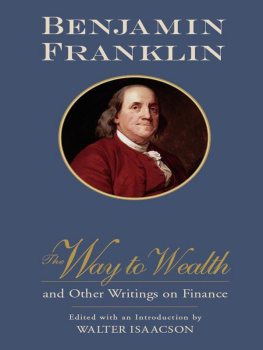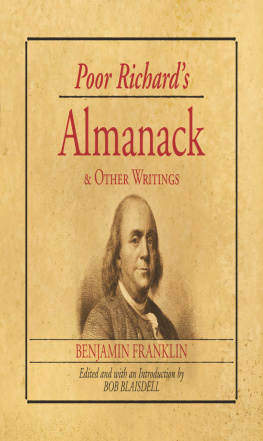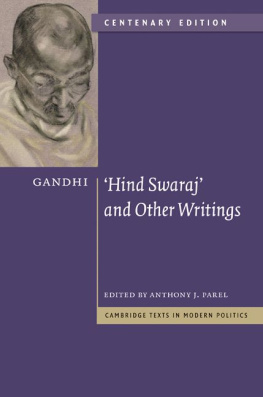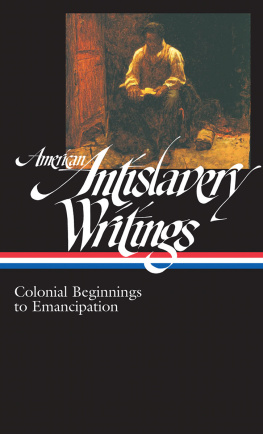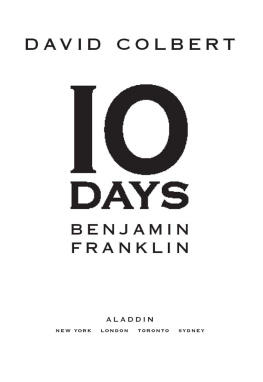PRAISE FOR THE COMPLETE ANTISLAVERY WRITINGS OF ANTHONY BENEZET, 17541783
The Philadelphia Quaker Anthony Benezet perhaps did more than any single person to start the international, ecumenical campaign to end the Atlantic slave trade, but for too long his work has been available only to specialist scholars. David L. Crosbys fine edition brings together Benezets antislavery writing in one volume for the first time, supported with clear introductions and much valuable reference material. It will immediately become an essential reference point for anyone interested in Benezet, Quakerism, eighteenth-century Philadelphia, and the early years of the international antislavery movement.
BRYCCHAN CAREY, author of From Peace to Freedom: Quaker Rhetoric and the Birth of American Antislavery, 16571761
Anthony Benezet, the French-born Huguenot turned Quaker, was the foremost antislavery fighter of the eighteenth century. David L. Crosby has in this volume placed the major antislavery writings of Friend Anthony Benezet before us, and in so doing he provides readers with what Benezet wrote and the sources he used to fight for black freedom. Crosbys annotations help show how Benezet used Quaker ideals, analyzed accounts of early travelers such as Andre Brue, John Atkins, and Wilhelm Bosman, and used ideas from the literary writings of thinkers like Frances Hutcheson and Montesquieu and discussions with black Philadelphians to develop the worlds first transatlantic antislavery movement.
MAURICE JACKSON, author of Let This Voice Be Heard: Anthony Benezet, Father of Atlantic Abolitionism
Finally, with this volume, Anthony Benezets seminal antislavery writings are conveniently made available in a reliable modern edition. David L. Crosbys annotations add real value for scholars and students seeking to understand the Quaker activist, whose publications informed and inspired abolitionists throughout the eighteenth-century Atlantic World.
JONATHAN D. SASSI, professor of history, College of Staten Island and CUNY Graduate Center
THE COMPLETE ANTISLAVERY WRITINGS OF ANTHONY BENEZET, 17541783
ANTISLAVERY, ABOLITION, AND THE ATLANTIC WORLD
R. J. M. BLACKETT and JAMES BREWER STEWART, SERIES EDITORS
THE COMPLETE
ANTISLAVERY
WRITINGS
OF
ANTHONY
BENEZET
1754-1783
AN ANNOTATED CRITICAL EDITION
EDITED BY
DAVID L. CROSBY
 Louisiana State University Press Baton Rouge
Louisiana State University Press Baton RougePublished with the assistance of the V. Ray Cardozier Fund
Published by Louisiana State University Press
Copyright 2013 by Louisiana State University Press
All rights reserved
Manufactured in the United States of America
First printing
Designer: Barbara Neely Bourgoyne
Typeface: Century Schoolbook
Printer and binder: Maple Press
Library of Congress Cataloging-in-Publication Data
Benezet, Anthony, 17131784.
[Works. Selections]
The complete antislavery writings of Anthony Benezet, 17541783 : an annotated critical edition / edited by David L. Crosby.
pages cm. (Antislavery, abolition, and the Atlantic world)
Includes bibliographical references and index.
ISBN 978-0-8071-5475-5 (cloth : alk. paper) ISBN 978-0-8071-5476-2 (pdf) ISBN 978-0-8071-5477-9 (epub) ISBN 978-0-8071-5478-6 (mobi) 1. SlaveryUnited StatesEarly works to 1800. 2. Slave tradeEarly works to 1800. 3. Antislavery movementsUnited StatesEarly works to 1800. I. Crosby, David L., 1941, editor. II. Title.
E446.B485 2014
306.3'62097309033dc23
2013034958
The paper in this book meets the guidelines for permanence and durability of the Committee on Production Guidelines for Book Longevity of the Council on Library Resources.

For my parents, Ambrose and Mary Frances Crosby, in memoriam
CONTENTS
ACKNOWLEDGMENTS
A project that took so long to complete is bound to owe many debts to helpers along the way. My greatest debt is to the National Endowment for the Humanities, which provided support for me to attend three Summer Seminars for College Teachers that sparked and nurtured my studies in Anthony Benezet. The first seminar on eighteenth-century rhetoric was led by Lloyd Bitzer of the University of Wisconsin, using the facilities of the University of London and the British Library. Here I first encountered Benezets use of English Enlightenment rhetorical strategies to attack the slave trade. A second seminar with John N. King and Jim Bracken at the Ohio State University explored early modern book publishing and new principles of bibliography and provided me many hours in the library to explore Benezets complex web of seventeenth- and eighteenth-century sources in voyage and travel literature. A third seminar, led by Joseph C. Miller at the Virginia Foundation for the Humanities and the University of Virginia Library, opened up for me a whole new world of research on the African roots of American culture. In this seminar I first realized that Anthony Benezet needed a modern critical edition of his antislavery writings for his work to attract the attention it so richly deserves.
I am grateful to Alcorn State University for granting me time over several summers to attend seminars. Two other institutions provided support for further study and research. The Library Company of Philadelphia awarded me an Albert M. Greenfield Foundation Fellowship for a month of research in its very strong collection of Benezet editions and sources. The National Historical Publications and Records Commission of the National Archives provided support for me to attend the Association for Documentary Editings Institute for the Editing of Historical Documents (Camp Edit) at the University of Wisconsin.
Many libraries have opened their doors to me over the years. In addition to the ones already mentioned, I have benefited from the collections and the helpful staff at the following libraries and historical societies: the Quaker Collection of Haverford College Library, the Friends Historical Library of Swarthmore College, the Alcorn State University Library, Friends House Library (London), the University of Southern Mississippi Library, the Louisiana State University Library, the University of AlabamaBirmingham Library, the Library of Congress, the Millsaps College Library, the University of Pennsylvania Library Rare Book Collection, the Historical Society of Pennsylvania, the Maryland Historical Society, the New York Historical Society, and the University of Southern Illinois Library.
Anyone who studies Anthony Benezet today benefits from the nineteenth-century biographers who collected and published the early records: Roberts Vaux, Wilson Armistead, and Joseph Elkington. Benezets sole twentieth-century biographer was the estimable George S. Brookes, whose Friend Anthony Benezet remains accessible and useful, especially for the many letters he transcribed, annotated, and published. I have also benefited mightily from the published work of Roger A. Bruns and Nancy Slocum Hornick. Among more recent scholars Maurice Jackson has shared his work and kindly taken the time to read mine and recommend it to others; Jonathan D. Sassi has been a faithful friend and fellow traveler in Benezets cause; and Geoffrey Plank provided welcome confirmation regarding the authorship of the 1754 Epistle. John Oldfield was the first scholar to suggest I send out an article for publication; James Walvin and Gad Heuman of Slavery and Abolition shepherded that article into print. David Brion Davis, Emma Lapsansky Werner, Srividya Swaminathan, Brycchan Carey, Susan H. Perdue, Vincent Carretta, and Larry Ingle offered encouragement and suggestions along the way. James Green, Tammy Gaskell, and Timothy Connelly gave me significant opportunities for study and fellowship with other scholars, an especially important commodity for independent researchers.


